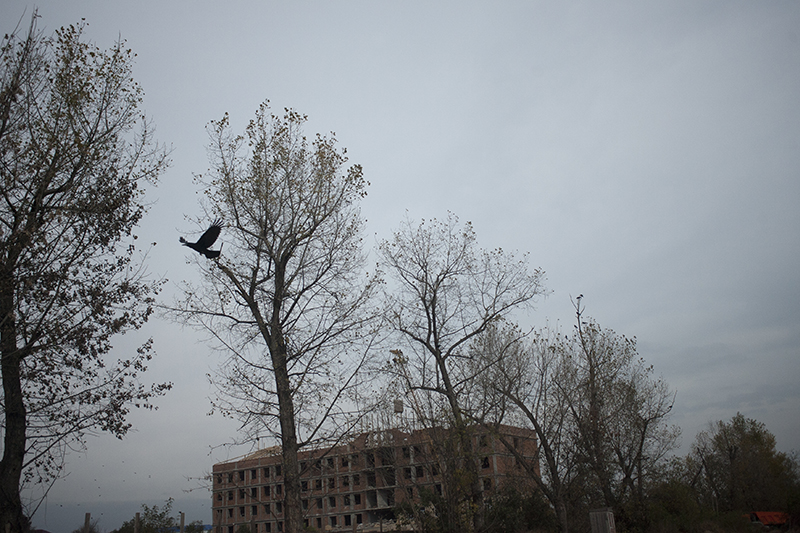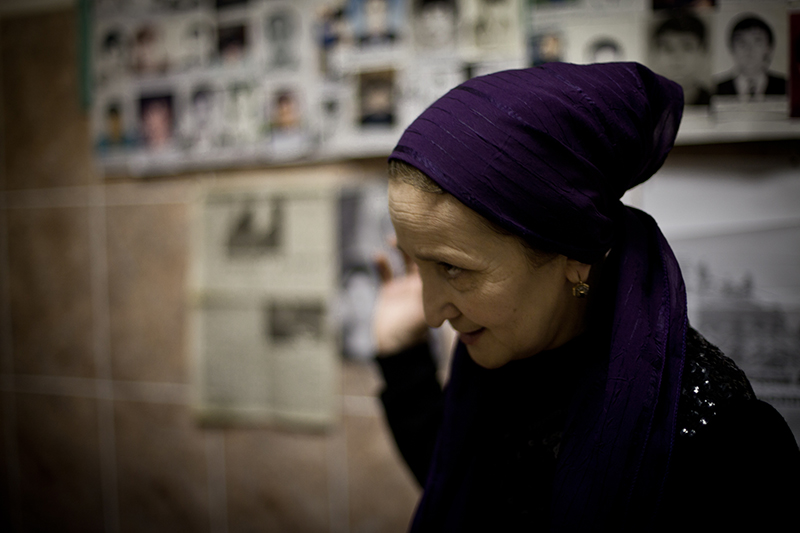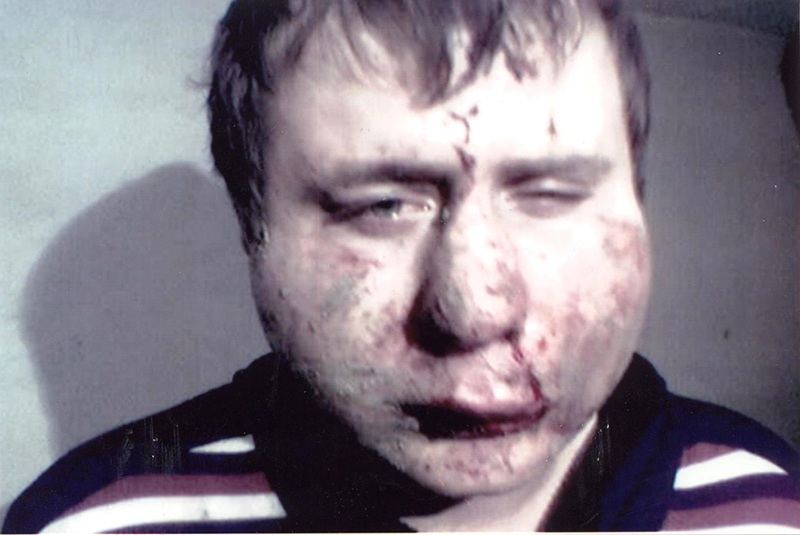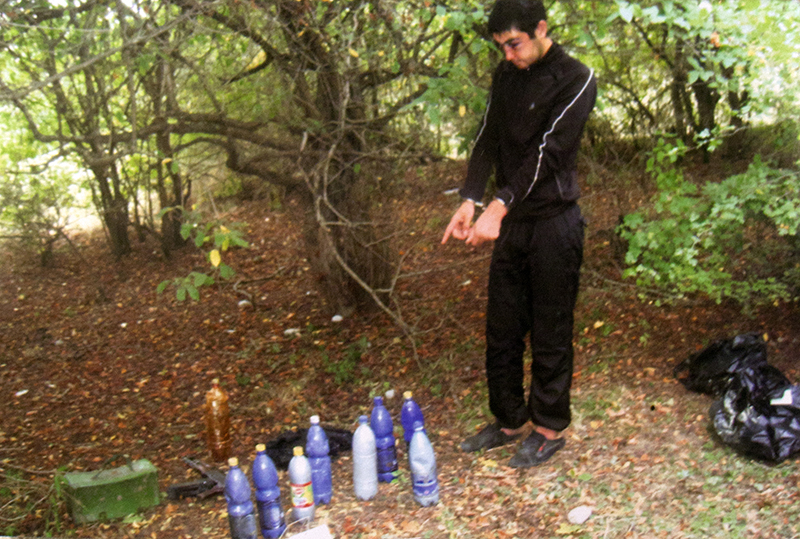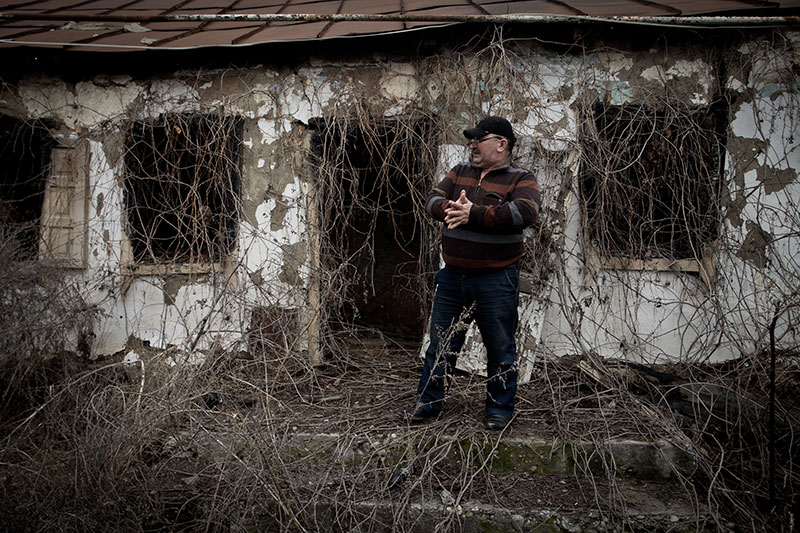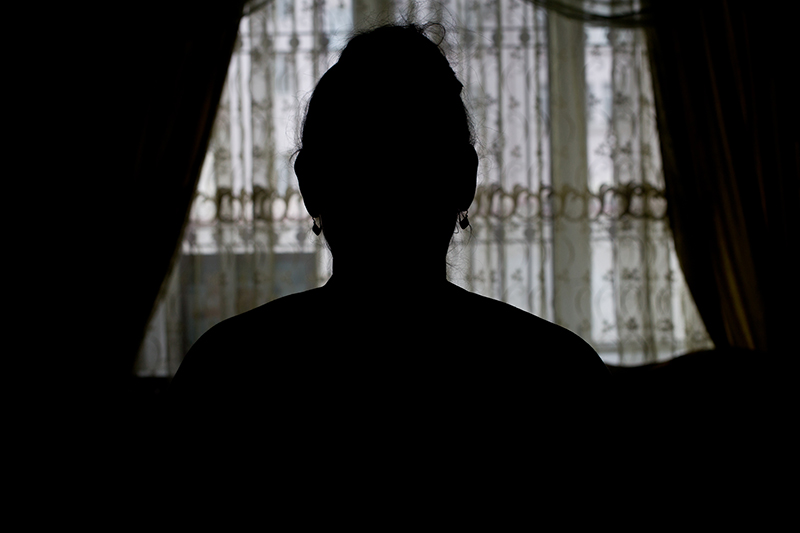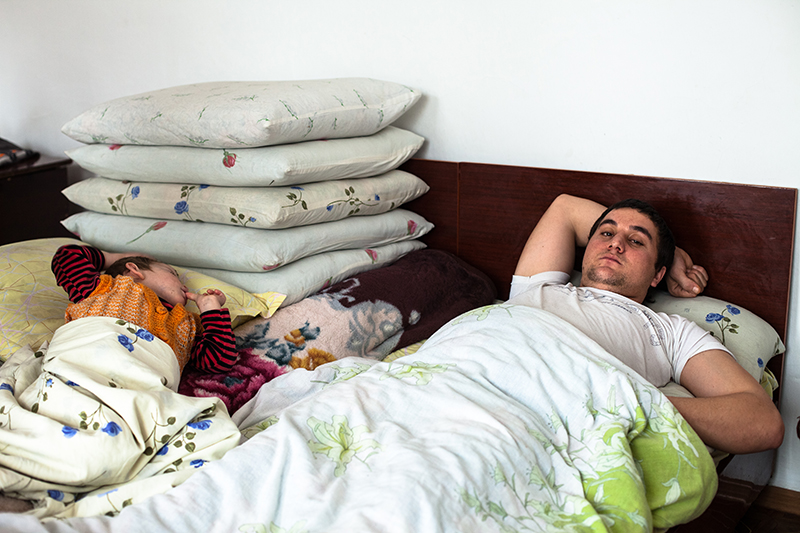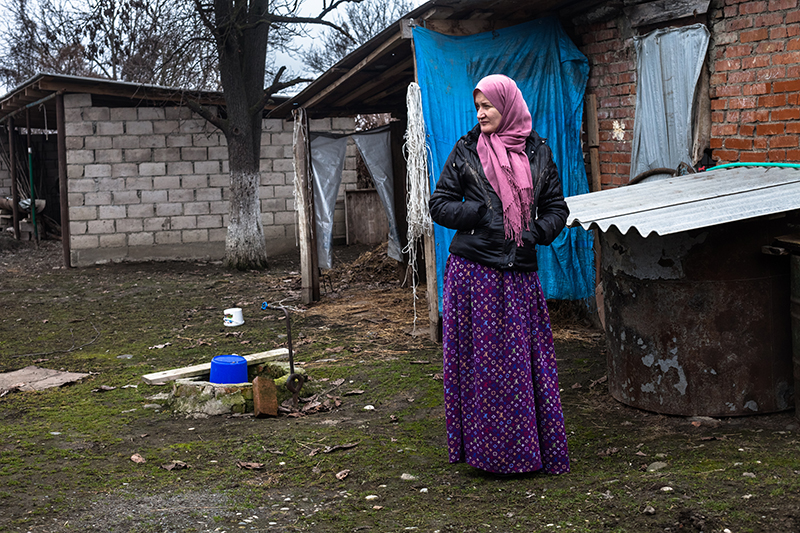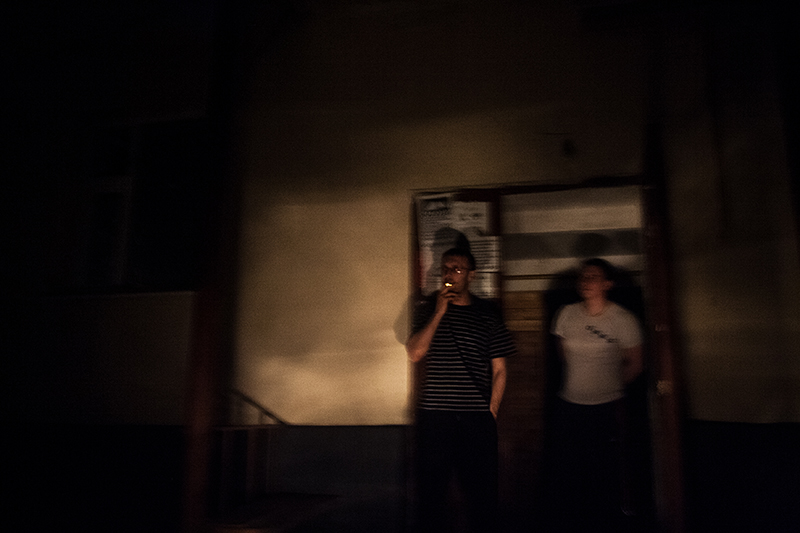Even though Chechnya is officially part of Russia and so prohibition can carry no legal weight, prohibition has nevertheless been imposed by Ramzan Kadyrov as part of his 'Islamization' policy. Shops are only allowed to sell alcohol between 8 am and 10 am. Omar Baytulayev never made a secret of the fact that he disagreed with the 'dry law', and so the local authorities decided to get rid of him.
TO: the Head of the Investigatory Administration of the Investigatory Committee of the Russian Federation in the Chechen Republic, Ledenyov V.A.
FROM: Baytulayev, Omar Akhmatovich (born 20.09.1961), Permanent address: Chechnya, Achkhoy-Martan region, Zakan-Yurt settlement, Mekhanizatorov Str., 19. (Phone number)
STATEMENT
My residential address is Chechnya, Achkhoy-Martan region, Zakan-Yurt settlement, Mekhanizatorov Str., 19. I’ve been residing there since 2004 with my wife, Baytulayeva Taitah Magovedovna, born in 1963, and my three daughters – Baytulayeva Bella Omarovna, born in 1986, Baytulayeva Zaremah Omarovna, born in 1987 and Baytulayeva Mariam Omarovna, born in 1999.
On 04.01.2011 I was at home, watching TV until late, and I went to bed at about 00.30. Before going to bed I locked the gates and the front door. At approximately 00.45 I woke up because I heard somebody knocking on the gate very loudly. I looked out of the window and saw strange men in the yard; there were ten of them. Since the gate had been locked, I realized that one of them had climbed over the yard fence and let the rest into the yard. All the people who broke into the yard of my household had firearms – submachine guns and pistols. They were dressed in camouflage uniforms. I didn’t see any masks over their faces. These people, with the help of their submachine guns, broke the electric lamp that was on in the yard, and it became dark.
I got dressed, opened the door and went out into the yard. At that point five or six people entered my house. One of them told me: “Didn’t we warn you that you should leave the settlement?” I told them not to enter the house and to let my wife and daughters get dressed. My request was ignored. I began to explain that I’d talked to the head of the administration and he had demanded that I leave the settlement and that I was about to sell my house as soon as the buyer obtained the resident certificate. The Prefect asked me if I could do it in one month and I told him that once the matter of the certificate was settled I’d be gone. But then they said: “So you are talking back?” After that, two of the visitors grabbed my hands and the third one hit me on the head with a plastic stool several times. I managed to break free and ran into the yard, but they caught up with me, knocked me down to the ground and started kicking me on different parts of my body, dealing blows till I fainted. When I came to, I saw that my wife and daughters had run out of the house and were imploring the men to stop beating me. Through the open gate I saw two Lada Priora cars next to my house. Meanwhile, I was lying on the concrete floor under the awning of my house. My wife and daughters asked me to keep still lest the uniformed men resume the beatings, which they might have done if they noticed that I’d regained consciousness. I saw that they’d turned away from me, so I sneaked unnoticed into the neighboring yard and ran into my neighbors’ place barefoot. I asked my neighbor to go and check if the persons who had beaten me had left my house. After a while my neighbor returned and told me that I could go back home. Having gone back, I discovered that there was a crowd of neighbors around my house; the house was on fire and the fire brigade was trying to extinguish it. At that point nobody was close to the house. From my wife and daughters I learned that they’d seen the aforementioned persons in the camouflage uniforms set our house on fire. As a result of the fire we lost all our furniture, 160 thousand rubles, the groceries, my documents and all of our clothes – mine, my wife’s and my daughters’. The total damage caused can be estimated at one million rubles. After some time I found out that among the persons who’d beaten me up and burned down my house were Tatsagov Valid Salambekovich and Khusayinov Akhmed Umarovich (formerly known as Umayev Ulbi Danilbekovich, but in 2003 he changed his name for reasons unknown), both of whom work at the Department of Internal Affairs of the Achkhoi-Martan region.
Based on these facts, the Investigatory Department of the Department of Internal Affairs of the Achkhoi-Martan region filed a case #56523 according to Article 167 of the Criminal Code of the Russian Federation. In the course of investigation, after certain procedures myself and my family were declared victims.
At the inquest, I was shown photographs of the suspected criminals. I identified Tatsagov Valid and Khusayinov Akhmed, both employees of the Department of Internal Affairs of the Achkhoi-Martan region. Interviews with both of them were conducted. After that, in accordance with the requirements of Article 151 of the Criminal Code of the Russian Federation, the criminal case was referred for further investigation to the Achkhoi-Martan Inter-Regional Investigatory Department of the Investigatory Committee of the Russian Federation in the Chechen Republic. I hoped that the investigation was at its final stage and the criminals would be arrested and tried in court, and that my rights would be restored.
However, I was profoundly mistaken and now I’m convinced that the laws of the Russian Federation don’t apply in Chechnya, where only force, money and power are treated with respect.
The head of the Investigatory Department of the Achkhoi-Martan region – a highly respected and professional officer and the most reputable person in the Chechen republic – has been fired for starting the action against people close to the Prefect of the Achkhoi-Martan region.
Trying to avoid the same fate, on 04.06.2011 the investigator of the Achkhoi-Martan region issued a resolution halting the prosecution of Tatsagov and Khusayinov according to article 167 of the Criminal Code of the Russian Federation, based on lack of evidence. The case was sent back to the Investigatory Department.
Following my complaint to the Public Prosecutor’s Office of the Chechen republic, this resolution was cancelled, but the case was left with the Department of Internal Affairs for some reason, allegedly in order to check the criminals’ accounts and alibis.
I believe that during the preliminary investigation of criminal case #56523 the norms of material, objective and international law have been grossly violated.
According to article 151 part 1 of the Criminal Code of the Russian Federation, a preliminary investigation of criminal deeds committed by employees of the Internal Affairs Ministry of the Russian Federation is to be conducted by investigators from the Investigatory Committee of the Russian Federation.
On 05.02.2007, the Constitutional Court of the Russian Federation issued the resolution #2-P that stated that according to article 15 part 4 of the Constitution of the Russian Federation, “generally accepted principles and norms of international law” and international treaties of the Russian Federation constitute a part of its legal system. If an international treaty of the Russian Federation contains rules other than the ones contained in domestic law, then the rules of the international treaty are to be followed.
By ratifying the Convention for the Protection of Human Rights and Fundamental Freedoms, the Russian Federation recognizes the jurisdiction of the European Court of Human Rights as supreme on matters of interpretation and implementation of the Convention and all accompanying protocols in cases of suspected violations of those treaties by the Russian Federation (Federal law #54-FZ, issued on 30.03.1998).
Thus, just as does the Convention of Human Rights and Fundamental Freedoms, the resolutions of the European Court of Human Rights – particularly the parts in which they give an interpretation of the content of the rights and freedoms defined in the Convention, based on the generally accepted principles and norms of international law, including the right to access to courts and fair justice – constitute a part of the Russian legal system, and therefore federal lawmakers must follow them while regulating public relations and the organs of law enforcement must follow them while enforcing the corresponding legal norms.
According to the precedent law of the European Court (see the resolution of the European Court of Human Rights, issued on 26.01.2006 on the case “Mikheev v. Russia”, paragraph 108), an investigation of complaints of brutal treatment must be thorough. That means that the state organs must not rely on hurried or unsubstantiated conclusions in stopping investigations or in making any other decisions. They must take all available and appropriate steps to collect all proof and evidence pertaining to the case, including testimonies of the witnesses, medical examinations etc. Any gap in the investigation which undermines the possibility of determining the cause of traumas or the personalities of the perpetrators can lead to violations of the above standards.
In the resolution of the case “Aksoy v. Turkey” (paragraph 2, issued on 18.12.1996), the European Court of Human Rights determined that an effective investigation must be urgent and unbiased.
Besides that, according to the precedent law of the European Court (see paragraph 110 of the resolution of the European Court of Human Rights on the case “Mikheev v. Russia”, issued on 26.01.2006), in order for the investigation of complaints of brutal treatment by representatives of the state to be effective, the investigation must be independent.
An investigation loses its independence when conducted by employees of the same division or institution to which the suspects of brutal treatment belong (see paragraphs 80-82 of the resolution of the European Court of Human Rights from 27.07.1998 on the case “Gyulech v. Turkey”). Independence of the investigation implies not only the absence of hierarchical connections, but also practical independence (see paragraphs 83-84 of the resolution of the European Court of Human Rights from 28.07.1998 on the case “Ergee v. Turkey”). I suspect that employees of the Department of Internal Affairs of the Achkhoi-Martan region and the Achkhoi-Martan Investigatory Administration of the Investigatory Committee of the Russian Federation in the Chechen republic are not independent from the Prefect of the Achkhoi-Martan region of the Chechen republic, because not long before the arson the Prefect paid me a visit accompanied by police officers whom he ordered to conduct an unlawful search, even though there was no court sanction.
Furthermore, the policemen followed this unlawful order obediently. Considering the situation of the dismissed chief of the Investigatory Division of the Department of Internal Affairs in the Achkhoi-Martan region, none of the people in question dares conduct a thorough investigation regarding the circumstances of the Prefect personally, since that would mean risking being fired and leaving their families with no support at such a hard time.
Thus it is my belief that the investigation of the beatings the policemen subjected me to and of the arson of my home, conducted by the investigator of the Achkhoi-Martan Investigatory Administration of the Investigatory Committee of the Russian Federation in the Chechen republic, does not meet the requirements of effective investigation as formulated by the European Court of Human Rights. Therefore in this case there is a violation of Article 13 of the European Convention for the Protection of Human Rights and Fundamental Freedoms, 1950. This, in turn, leads to the conclusion that the employees of the Achkhoi-Martan inter-region investigatory committee of the Investigatory Committee of the Russian Federation in the Chechen republic either don’t want to or aren’t allowed to investigate criminal cases involving employees of the Police in the Achkhoi-Martan region.
I am prepared to write a complaint to the European Court of Human Rights and, as you understand, the Court will gladly process it, which will cause harm to the international image of Russia. However, as a patriot and a man who loves my Fatherland, I’m trying to find justice at a domestic level and I regard an appeal to the European Court as a last resort for restoring my abused rights.
Based on the above and in correspondence with Article 39 of the Criminal Code of the Russian Federation,
I REQUEST:
1. A withdrawal of the criminal case #56523 for examination of the violations of Russian law and abuses of my rights as a party involved, in order to conduct a preliminary investigation of said criminal case.
2. A referral of the criminal case #56523 to the Department of High-Priority Investigations of the Investigatory Administration of the Investigatory Committee of the Russian Federation in the Chechen republic for a further unbiased investigation.
Sincerely,
(SIGNED)
Baytulayev O.A. 30.09.2011























